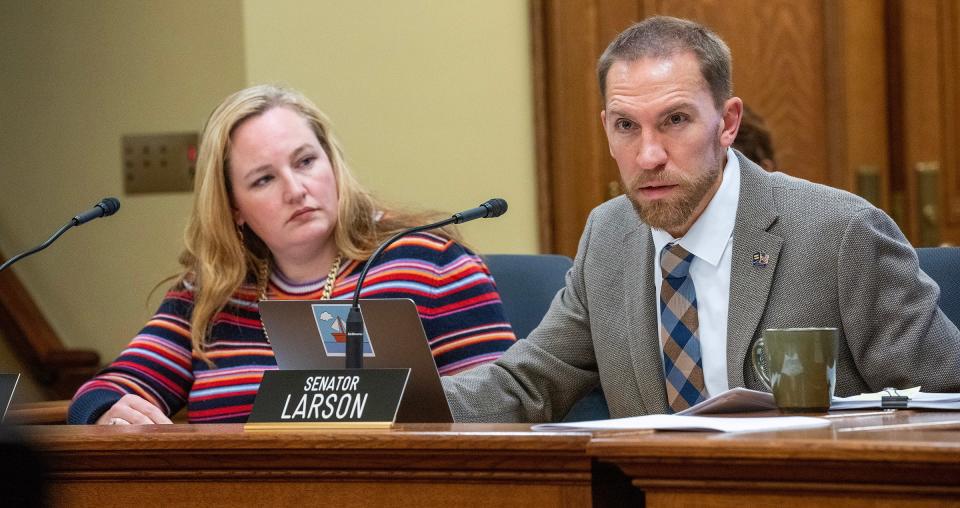Some Wisconsin legislators want state law changed to prevent TCE apartment evacuations from happening again
- Oops!Something went wrong.Please try again later.
- Oops!Something went wrong.Please try again later.
Developers at two Milwaukee-area apartments who failed to properly test and inform the state of environmental issues, exposing residents to high levels of a carcinogen and ultimately prompting city-ordered evacuations, technically didn't break the law.
Now, some state leaders are seeking to strengthen the state environmental agency’s oversight over developers.
Currently, the DNR can only recommend — not require — the clean-up of former industrial sites being developed into residential units.
“If the watchdog doesn't have teeth, it's not really a watchdog,” state Sen. Chris Larson, D-Milwaukee, said. “DNR is already operating with two hands tied behind its back on this.”
After the first evacuation of Community Within The Corridor apartments, prompted by the discovery of high levels of trichloroethylene or TCE, the Department of Natural Resources remediation and redevelopment program director Christine Sieger called the incident “unprecedented.” She noted that “99% of developers follow the state’s recommendations.”
Four months later, Glendale health officials were forced to evacuate luxury apartments in Bayshore Mall due to high levels of the same chemical.
State Sen. Robert Cowles, R-Green Bay, chair of the committee that oversees the DNR, told the Journal Sentinel that he would “certainly” consider legislation strengthening the department’s enforcement power if presented to his committee.
Meanwhile, Gov. Tony Evers’ spokesperson Britt Cudaback said the governor is open to efforts that will reduce residents' exposure to harmful contaminants, but did not specify whether he would support changing the law to strengthen the DNR's enforcement authority over developers.
“A critical, initial step toward addressing these issues moving forward is improving local interagency communication and information sharing,” Cudaback added. “We will support those efforts.”
Existing laws ‘not working for Wisconsinites’
Under current state statute, the DNR is not allowed to carry out its own inspections or testing until developers notify them of contamination at properties such as Community Within The Corridor and The Lydell, DNR field operations director Trevor Nobile said.
Moreover, the environmental agency is not allowed to mandate clean-up efforts and can only recommend them. If the developer chooses not to comply with these recommendations, there are no repercussions for developers.
Neither developer has faced prosecution or fines for moving people into apartments that had unsafe levels of a chemical that has been tied to liver damage, kidney disease, Parkinson’s disease and fatal fetal cardiac defects.
“The difference between recommendation and requirement is a big one, so more authority would take rule change,” Nobile said.
As a regulator, Nobile said he cannot advocate for changes to state law. However, his department has been working to improve interagency communications to prevent evacuations of this nature from occurring again.
But some lawmakers think more needs to be done.
“The existing framework is not working for Wisconsinites,” said state Sen. Kelda Roys, D-Madison.
“We need to have a framework that takes exposure to dangerous contaminants seriously and that punishes polluters and those who knowingly expose people to harmful chemicals," she said.

Consideration of changes to the DNR’s authority comes as the state’s largest business lobby challenges state law regulating the clean-up of contaminated sites.
Some GOP lawmakers have supported the lawsuit, leading Larson to call Cowles “upstanding" while criticizing other Republicans favoring developers.
“If (Cowles) is earnest about it, hopefully, the DNR hears that and does bring forward some recommendations on how to fix these problems,” Larson added.
Recently, Republican lawmakers also stripped an $8 million proposal from Evers' budget meant to revitalize contaminated properties like dry cleaning facilities that have been linked to TCE spills.
"(Republicans) still have the opportunity in the upcoming session to work with Democrats and pass legislation to clean up contaminated properties around Wisconsin," state Rep. Darrin Madison, D-Milwaukee, whose district includes the Community within the Corridor, said in an email.
What public health experts are saying
For local health officials, evacuations of this nature have highlighted cracks in state statute.
“This all has shown us all that there are huge gaps in the system,” said North Shore Health Department public health officer Becky Rowland, who issued evacuation orders for the Lydell apartments.
Tracey Woodruff, an environmental health expert at the University of California, San Francisco, said governments should play an active role throughout the remediation and redevelopment processes.
"We have to be mindful about having the government be active ... and ensuring these developers and industries are held accountable,” Woodruff said.
Larson added that the DNR’s power is currently “reactive instead of proactive.”
“It's kind of a catch-22,” Larson said. “They're left waiting for these toxic landmines to go off before anybody knows about them and obviously by then people have been exposed to cancer-causing chemicals — in this case, for months.”
Madison echoed Larson's opinion that current regulations depend too much on developers to do the right thing.
"We should not rely on for-profit developers to police themselves," Madison said. "We need a strong DNR that has the resources to adequately test and regulate development."
This article originally appeared on Milwaukee Journal Sentinel: Wisconsin officials want law changed to prevent more TCE evacuations

